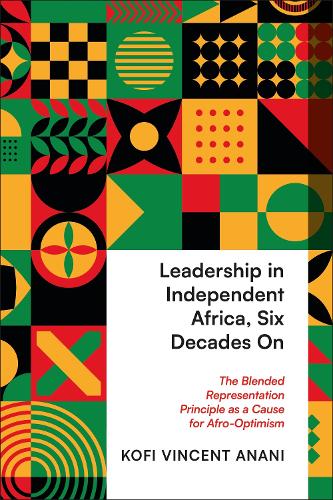
Leadership in Independent Africa, Six Decades On: The Blended Representation Principle as a Cause for Afro-Optimism
(Hardback)
Available Formats
Publishing Details
Leadership in Independent Africa, Six Decades On: The Blended Representation Principle as a Cause for Afro-Optimism
By (Author) Kofi Anani
Bloomsbury Publishing PLC
Zed Books Ltd
22nd February 2024
United Kingdom
Classifications
Professional and Scholarly
Non Fiction
320.46
Physical Properties
Hardback
256
Width 152mm, Height 236mm, Spine 20mm
520g
Description
Africa needs fresh thinking on its leadership and governance challenges, particularly when it comes to the disconnects between traditional leadership models and governance structures within the modern state. In Ghana, former Finance Minister Kwabena Duffor has even issued an explicit call to major political parties to encourage the empowerment of chiefs and traditional rulers [] as partners in development. Yet to date there has been very little academic literature on what exactly this means or what it would or could look like. In Leadership in Independent Africa, Six Decades On, Kofi Anani lays the necessary groundwork for workable ways forward. He does so through an in-depth exploration of the many meanings and practical implications of the Blended Representation Principle (BRP), which stipulates that power be shared between leaders selected on the basis of Western-democratic ideals and leaders chosen on the basis of traditional African norms and conventions. Drawing on a diverse array of academic research as well as copious professional experience, Anani shows how incorporating this principle into African leadership and governance thinking can encourage more voluntary public participation in politics, guarantee transparency and accountability in decision-making, particularly when it comes to the use of public resources, and ultimately encourage more public confidence in leaders. He also provides concrete suggestions for how to achieve all this, not through quick fixes, but rather through creating dedicated educational campaigns directed at public officials and through establishing communities of learning and practice to champion the BRP in villages, schools, places of worship, public work places, and social organizations. This book is a must-read for all scholars and students of postcolonial governance and leadership, and it is of keen interest to anyone concerned with how Western-style state-making might ultimately find a balance with other, indigenous modes of social organization.
Author Bio
Kofi Anani is a Managing Partner of the Anani-Afele Network, a "think-and-do-tank" dedicated to utilizing blended knowledge for transformative development in Africa. He has spent more than two decades working in international development. He worked at the World Bank in Washington, D.C.; he worked in Development Finance at the United Nations Mission in Kosovo; and he served for five years as Executive Secretary of the Ghana Refugees Board (2015 - 2020).
